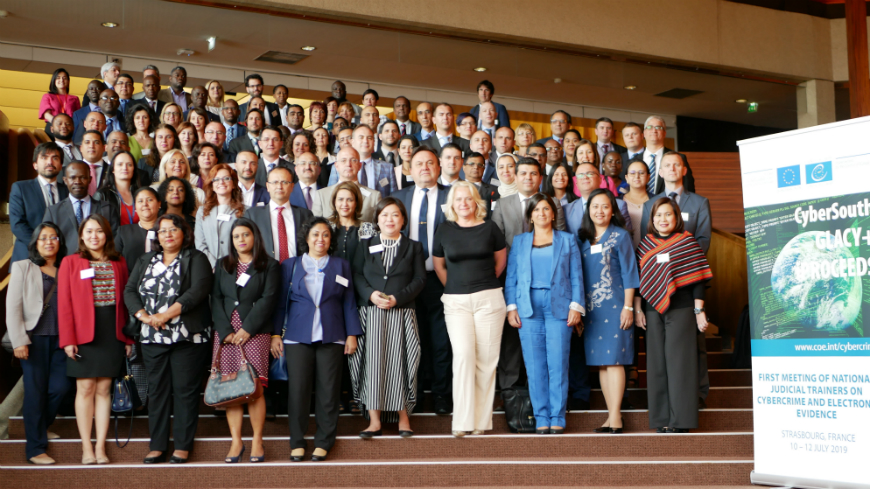IPROCEEDS - Coopération internationale en matière de lutte contre la Cybercriminalité

Pays participants: l'Albanie, la Bosnie-Herzégovine, le Monténégro, la Serbie, "l’Ancienne République yougoslave de Macédoine", la Turquie et le Kosovo*
Objectif: Renforcer la capacité des autorités dans la région de l'IAP à rechercher, saisir et confisquer les recettes provenant de la cybercriminalité et prévenir le blanchiment d'argent sur l'Internet.
Les indicateurs comprennent :
- Etendre les enquêtes financières et les poursuites liées à la cybercriminalité et les recettes provenant de la criminalité en ligne.
- Le niveau de conformité avec les normes internationales sur la cybercriminalité, le blanchiment d'argent et de la perquisition, la saisie et la confiscation des recettes provenant de la cybercriminalité (Conventions du Conseil de l'Europe STE 185 et 198).
*Cette désignation est sans préjudice des positions sur le statut et est conforme à la résolution 1244 du Conseil de sécurité des Nations unies ainsi qu'à l'
Documentation
- Project Summary
- Launching Conference - Ohrid, North Macedonia
- Budapest Convention on Cybercrime: English - French - Bosnian - Macedonian - Turkish
- Explanatory report to the Budapest Convention on Cybercrime: English - French
- Additional Protocol on Xenophobia and Racism: English - French
- Explanatory report to the Additional Protocol on Xenophobia and Racism: English - French
Reports
- MONEYVAL Research Report on Criminal money flows on the Internet: methods, trends and multi-stakeholder counteraction
- Electronic Evidence Report: ENG/ ALB/ MK/ RS/ TR
- Online fraud and other cybercrime reporting mechanisms: Albania/ Bosnia and Herzegovina/ Montenegro/ North Macedonia/ Serbia/ Turkey/ Kosovo*
- Findings and Recommendations for improvement of guidelines and indicators for financial sector entities to prevent and detect online fraud and money laundering in the online environment: Albania/ Bosnia and Herzegovina/ Montenegro/ North Macedonia/ Serbia/ Turkey/ Kosovo*
Resources
- Digital Forensics Guide (available on the Octopus community upon registration)
- Electronic Evidence Guide (available on the Octopus community upon registration)
- Basic Course on the Search, Seizure and Confiscation of Online Crime Proceeds (available on the Octopus community upon registration)
- Introductory training module on cybercrime, electronic evidence and online crime proceeds (available on the Octopus community upon registration)
- Self-Guided Training Manual: Advanced Course on the Search, Seizure and Confiscation of Online Crime Proceeds (available on the Octopus community upon registration)
- Template: Mutual Legal Assistance Request for subscriber information (Art. 31 Budapest Convention). Available in Albanian, Bosnian,
Macedonian, Montenegrin, Serbian and Turkish - Template: Data Preservation Request (Articles 29 and 30 Budapest Convention). Available in
Albanian, Bosnian, Macedonian, Montenegrin, Serbian
and Turkish
Guidelines
- General guide and Explanatory Report on Protocols on interagency and international cooperation for investigations involving proceeds from crime online:

Judges and prosecutors play an important role in the investigation, prosecution and adjudication of individuals or groups that have committed crimes. With the increased number of incidence where these crimes have a digital element, a need is created for judges and prosecutors to be properly trained to understand the nature of these crimes and to also be aware of the legislation and the instruments for international cooperation available to handle cases of cybercrimes. Experience suggests that in most cases, judges and prosecutors encounter difficulties in coping with the new realities of the cyber world.
Developing sustainable training programmes is the only effective manner of ensuring that judges and prosecutors have sufficient knowledge to fulfil their roles effectively. To this end, the Council of Europe cooperates with countries to identify their needs and then work with them:
- To enable training institutes to deliver initial and in-service cybercrime training based on international standards
- To create a cadre of national trainers that are able to deliver courses as part of a documented training strategy for judicial training
- To equip the largest possible number of future and practicing judges and prosecutors with basic knowledge on cybercrime and electronic evidence
- To provide advanced training to a critical number of judges and prosecutors
- To support the continued specialisation and technical training of judges and prosecutors
- To contribute to enhanced knowledge through networking among judges and prosecutors
The Council of Europe now intends to take this a step further by discussing the feasibility and the sustainability of an international network of national judicial trainers on cybercrime and electronic evidence. The purpose is to permit national trainers to connect, share experience and remain up-to-date.
The first Meeting of the National Judicial Trainers on Cybercrime and Electronic Evidence took place on 10-12 July 2019 in Strasbourg, France. Around 100 judges, prosecutors, representatives of training institutions and other national authorities from more than 20 countries of Europe, Africa, Latin America and Asia Pacific met to increase their knowledge with regard to the current global landscape of cybercrime, responses regarding cybercrime and electronic evidence, including the standards of the Budapest Convention on Cybercrime and the work of the Cybercrime Convention Committee (T-CY). Participants shared their experience, challenges good practices, as well as needs and priorities related to training on cybercrime and electronic evidence and considered the benefits, feasibility and steps to be taken regarding a network of national judicial trainers on cybercrime and electronic evidence.
CHECK THE MEETING WEBPAGE FOR PRESENTATIONS AND MORE RESOURCES
iPROCEEDS Video
Secrétariat du T-CY
Alexander SEGER
Secrétaire exécutif
Jan KRALIK
Manager de programme


